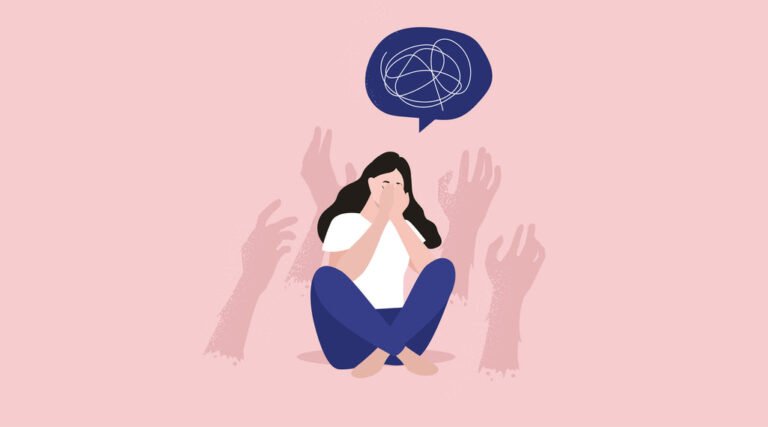Parenthood opens you up to a whole new world of responsibilities, emotions, and a sense of worry unlike anything you’ve seen before. Whether you’ve just given birth to a new baby or recently adopted, adjusting to life with a newborn is just as stressful. Most of the worries and fears you experience at first go away as you learn to trust yourself, get to know your baby and settle into a routine – but sometimes these feelings don’t go away. If your feelings of anxiety are overwhelming or you are constantly scared or nervous, you may be experiencing postpartum anxiety (PPA). To understand more about postpartum anxiety, we need to take a closer look at its causes, symptoms, and treatments.
What is postpartum anxiety?
It’s natural to worry about your newborn – caring for another human being is a big responsibility that you shouldn’t take lightly. However, when these worries begin to occupy every waking moment and even keep you awake at night, it may indicate a more serious anxiety disorder known as postpartum anxiety. Postpartum anxiety only occurs within the first year of childbirth or adoption. Pregnant women may also experience antenatal anxiety (anxiety during pregnancy) and perinatal anxiety, or anxiety experienced from early pregnancy to one year after delivery. These anxious thoughts generally consist of extreme “what if” scenarios where you imagine harming your baby or yourself. They are also generally “catastrophic” meaning they tend to include the worst case scenario. There is no set screening for postpartum anxiety, but it can often be detected during an evaluation for postpartum depression completed by your healthcare provider. Several websites host Postpartum Anxiety Quiz options that, once completed, can be a starting point when discussing your concerns with a physician.
What causes postpartum anxiety?
There are many causes of PPAand health care providers believe that several factors can contribute to the development of PPA symptoms.
- Hormone change: Hormonal changes after childbirth can be abrupt, leading to exaggerated stress reactions and mood swings
- The lack of sleep: Sleep deprivation has negative effects on your mental health
- Feelings of responsibility: The overwhelming feeling of wanting to protect your baby and the fear that you can’t
- Stressful events: Events in your baby’s life could cause anxiety. For example, when they start to crawl, eat solid food or if you have had problems with breastfeeding or had a difficult pregnancy or birth
- History of anxiety disorders: A previous diagnosis of anxiety or depression increases your chances of developing PPA
- Previous trauma: If you have lost a pregnancy or child in the past, if you have a child or children with health conditions, or if you have previously been diagnosed with PTSD, all contribute to the possibility of PPA
Symptoms of postpartum anxiety
Postpartum anxiety symptoms can manifest physically, behaviorally or emotionally. Many new parents describe the feeling of “madness” or the experience of both rational and irrational racing thoughts. Signs and symptoms of postpartum anxiety include, but are not limited to:
Physical symptoms:
- Difficulty catching your breath
- Insomnia
- Loss of appetite
- Stretched muscles
- Difficulty settling or sitting still
- Nausea or stomach pain
- Increased heart rate or palpitations
Behavioral symptoms:
- Avoidance behaviors, such as avoiding certain activities, people, or places
- Be overly cautious in non-dangerous situations
- Obsessive compulsive behaviors like checking things over and over
- He refuses to relinquish control or accept help
Emotional symptoms:
- Irritable
- An overwhelming sense of dread or doom
- Fear
- Excessive worry
- Inability to relax
- Forgetfulness, feeling distracted or unable to focus
- Obsessive thoughts about things that could go wrong but aren’t likely to
Treatments for postpartum anxiety
Fortunately, there are many treatment options for people who suffer from postpartum anxiety. Each treatment plan depends on the severity of your condition.
Mild PPA: Talking with a fellow new parent or an understanding friend or family member can be enough to ease the feelings of worry or dread you experience with mild PPA. Vitamin and nutrient supplements like ours Postpartum mood support contains vital ingredients to support balanced postpartum emotions, cortisol levels and mood stability. Practicing mindfulness – a type of meditation in which you focus on being aware of what you are feeling and feeling in the moment – can help reduce stress. Us Calm tea with lavender, dandelion, peppermint and lemon balm, it’s another great addition to your relaxation routine.
Moderate PPA: Speak or cognitive behavioral therapy is useful for those experiencing moderate symptoms of PPA. A licensed mental health professional can provide you with tools and advice to help you manage your stress levels – cognitive restructuring or reframing is a useful strategy as it focuses on identifying negative thought patterns and how to reframe them into more positive and productive thoughts. As with mild cases of PPA, limiting and reducing stress is beneficial, along with completion key mood-stabilizing nutrients such as ashwagandha for stress and anxiety relief and B6 for improved mood and energy levels.
Severe PPA: If your symptoms are severe, your healthcare provider could prescribe medication in addition to cognitive behavioral therapy. Selective serotonin reuptake inhibitors (SSRIs) are the class of antidepressant and anti-anxiety medications commonly prescribed to those experiencing severe postpartum anxiety. They work by increasing the amount of serotonin in your brain and are generally considered safe to use during pregnancy and breastfeeding.
If you experience overwhelming thoughts of fear or worry, or if you feel anxious, stressed, or depressed to the point that you fear your ability to care for yourself or your child, seek help from a medical professional. To learn more about how to navigate life after giving birth, we recommend:
